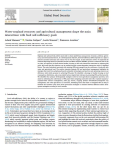Mamassi A., Guilpart N., Muneret L., Accatino F. (2025). Water-cropland resources and agricultural management shape the main interactions with food self-sufficiency goals. Global Food Security, 01/03/2025, vol. 44, p. 100841.
https://doi.org/10.1016/j.gfs.2025.100841
https://doi.org/10.1016/j.gfs.2025.100841
| Titre : | Water-cropland resources and agricultural management shape the main interactions with food self-sufficiency goals (2025) |
| Auteurs : | A. Mamassi ; N. Guilpart ; L. Muneret ; F. Accatino |
| Type de document : | Article |
| Dans : | Global Food Security (vol. 44, March 2025) |
| Article en page(s) : | p. 100841 |
| Langues : | Anglais |
| Langues du résumé : | Anglais |
| Catégories : |
Catégories principales 08 - ALIMENTATION ; 8.3 - Politique et Sécurité AlimentaireThésaurus IAMM SECURITE ALIMENTAIRE ; AUTOSUFFISANCE ; RESSOURCE EN EAU ; RESSOURCE FONCIERE ; TERRE CULTIVEE |
| Résumé : | Regional and national food policies must seek to attain equilibrium among social, economic, political, agricultural, and environmental factors. As a developmental objective, food self-sufficiency (FSS) responds to a region's need for increased autonomy and control over its own food supply. In this systematic review, we employed the Preferred Reporting Items for Systematic Reviews and Meta-Analyses (PRISMA) protocol to assess the state of the art, then, we explored 109 final selected studies, focusing on the main interactions associated to achieving FSS goals. We found that FSS objectives can be realised through context-dependent interactions with 47 identified factors. The main limitations associated with attaining FSS goals emerge from the confluence of trade-offs with water and agricultural land. The positive interplay between FSS and agricultural management highlights the synergies that result from adopting advanced sustainable technologies and practices and optimizing resource-use efficiency, which holds promise for achieving FSS goals. We identified a shortage of studies focusing on food consumption, distribution, and access related factors, despite their relevance in promoting FSS and food security. We identified four primary developmental strategies rooted in local agricultural management practices, each aimed at addressing the achievement of FSS goals while mitigating associated trade-offs: cropland expansion/cropland-water resource management, yield gap closure, cropping systems diversification/integrated crop management, and urban agriculture. In conclusion, identifying factors that limit or strengthen FSS can help to facilitate the transition away from siloed government strategies to arbitrate between different holistic development strategies according to local contexts. |
| Cote : | En ligne |
| URL / DOI : | https://doi.org/10.1016/j.gfs.2025.100841 |







